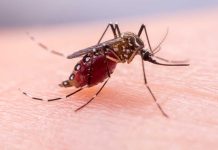
(DailyDig.com) – A human in Pueblo County, Colorado, has contracted the bubonic plague, according to the Public Health Department. Officials have not provided any information about the individual.
The lab results revealed a rare case of a human testing positive for the plague. In the Middle Ages, the plague, often called the “Black Death,” killed millions of individuals. However, the number of human cases is currently considered rare, according to the Centers for Disease Control and Prevention (CDC).
The bacteria Yersinia pestis is the cause of bubonic plague and may threaten the lives of any human who contracts it. According to the CDC, humans often contract the plague by handling an infected animal or by being bitten by a flea carrying the bacteria.
In the 1900s, rats infected with the plague or covered with infected fleas arrived on South Asian ships, according to Timothy Brewer, a doctor and professor at UCLA. He said the disease became indigenous to the United States after infecting rodents and ground squirrels in the rural Southwest.
When the plague’s bacteria infect an animal or human, the fatality rate ranges from 30 to 60 percent. If treated with antibiotics, the rate of death drops to less than five percent. On average, there are around seven human cases per year in the United States. Globally, the average human case is somewhere between one thousand and two thousand, according to the World Health Organization (WHO).
According to the CDC website, the age range of individuals infected with the plague is approximately 50 percent between 12 and 45 years old.
Bubonic plague symptoms include a severe headache, sudden chills and fever, vomiting, nausea, muscle aches, and a general feeling of being ill. Swollen lymph nodes and pain are common among the symptoms.
Erica Susky, an infection control doctor in Canada, cautioned that fleas and rodents could transmit the plague to humans and pets. It can also spread from person to person, or when hunting, by coming into contact with body fluids while skinning or dressing an animal.
Copyright 2024, DailyDig.com













